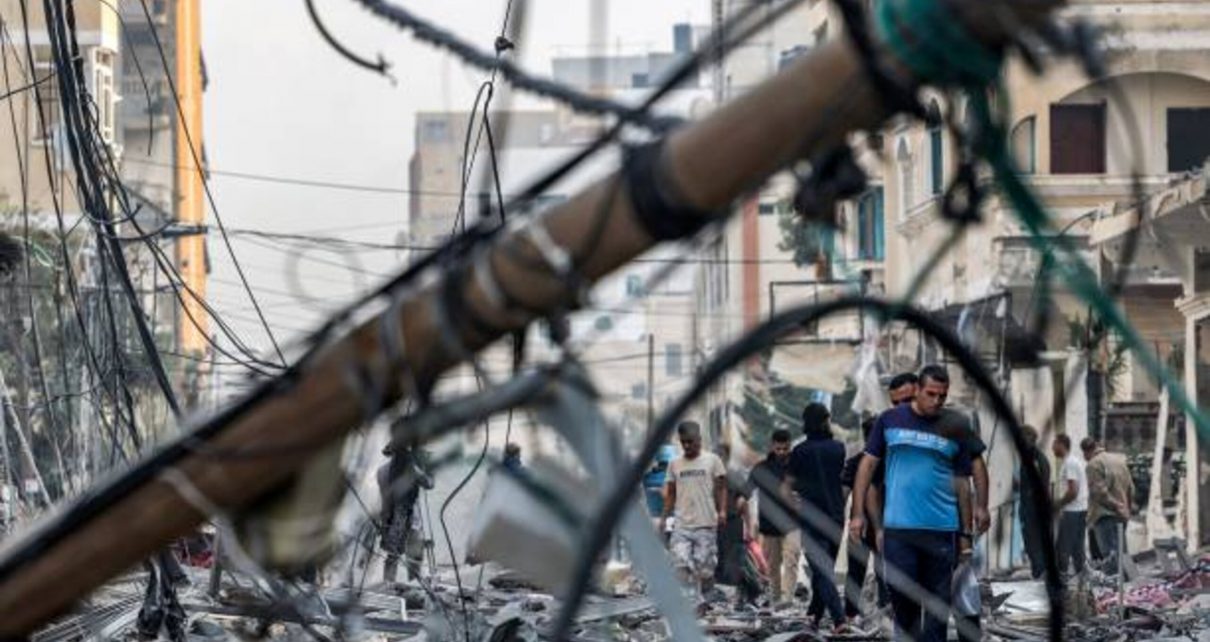The once-peaceful neighbourhood of Rimal in Gaza City has been brutally shaken as Israeli warplanes carried out a series of air strikes in response to an unprecedented assault by a Palestinian militant group from the Gaza Strip. The strikes have resulted in substantial damage to residential buildings, telecommunications company offices, and university buildings, amplifying the challenges facing Gaza’s already beleaguered residents.
The night was fraught with terrifying explosions that left children screaming, shattering the neighbourhood’s tranquillity. Residents of Rimal, known for its relative affluence and serenity, endured a night of horror that will be etched in their memory for years to come.
With the dawn of a new day, the intensity of the strikes began to wane, revealing the true extent of the destruction. The neighbourhood’s infrastructure was severely compromised, and most roads leading to it were impassable, rendering it almost unrecognisable.
As I drove through the area, the aftermath resembled the aftermath of an earthquake, with rubble, shattered glass, and severed wiring scattered everywhere. The impact on the community is profound, with many residents losing their homes and businesses.
“I lost everything. My apartment, where my five children lived, was here in this building. My grocery shop below the building was destroyed,” shared a disheartened Mohammed Abu al-Kass as he carried his daughter Shahd through the debris-laden streets. He, like many others, finds himself without shelter or work, grappling with the grim reality of their situation.
The Palestinian health ministry reports that Israeli attacks on Gaza resulted in the deaths of about 300 people, with two-thirds of them being civilians, on Monday. This marked one of the deadliest days in the region in years. In the densely populated Jabalia refugee camp, at least 15 people were killed. While the Israeli military claimed to have targeted a Hamas commander’s home, many casualties occurred in a nearby market and neighbouring houses.
The overall death toll in Gaza since Saturday stands at 900, including 260 children and another 4,500 people have been injured. The dire humanitarian crisis in the territory is exacerbating. Gaza’s 2.2 million residents are grappling with severe shortages of food, fuel, electricity, and water, as Israel imposed a “complete siege” in response to Hamas’s attack.
Families are struggling without basic necessities. “Can you imagine that we are living without power or water in the 21st Century? My baby has run out of nappies and there is only half a bottle of milk left,” lamented Waad al-Mughrabi.
The fighting shows no sign of abating, leading to concerns of a protracted crisis. Gazans are queueing outside supermarkets, hoping to secure provisions for the difficult days ahead. The severe fuel shortage is hampering the transport of fresh vegetables and fruits, which primarily come from the south of the territory.
Efforts to procure aid from Egypt, which has maintained a blockade of Gaza along with Israel since 2007, have not borne fruit so far. The Rafah border crossing, typically used by Gazans to enter or leave the territory, has been hit by Israeli air strikes, bringing all crossings to a halt. Consequently, most of the 200,000 people who have fled their homes are seeking refuge in UN-run schools.
The situation has reached a point where even once-considered safe havens have become perilous, as demonstrated by the Israeli strikes on Rimal. Gaza’s residents are enduring immeasurable hardships, with the true extent of their suffering likely to continue growing as the conflict persists. (with BBC reports)


